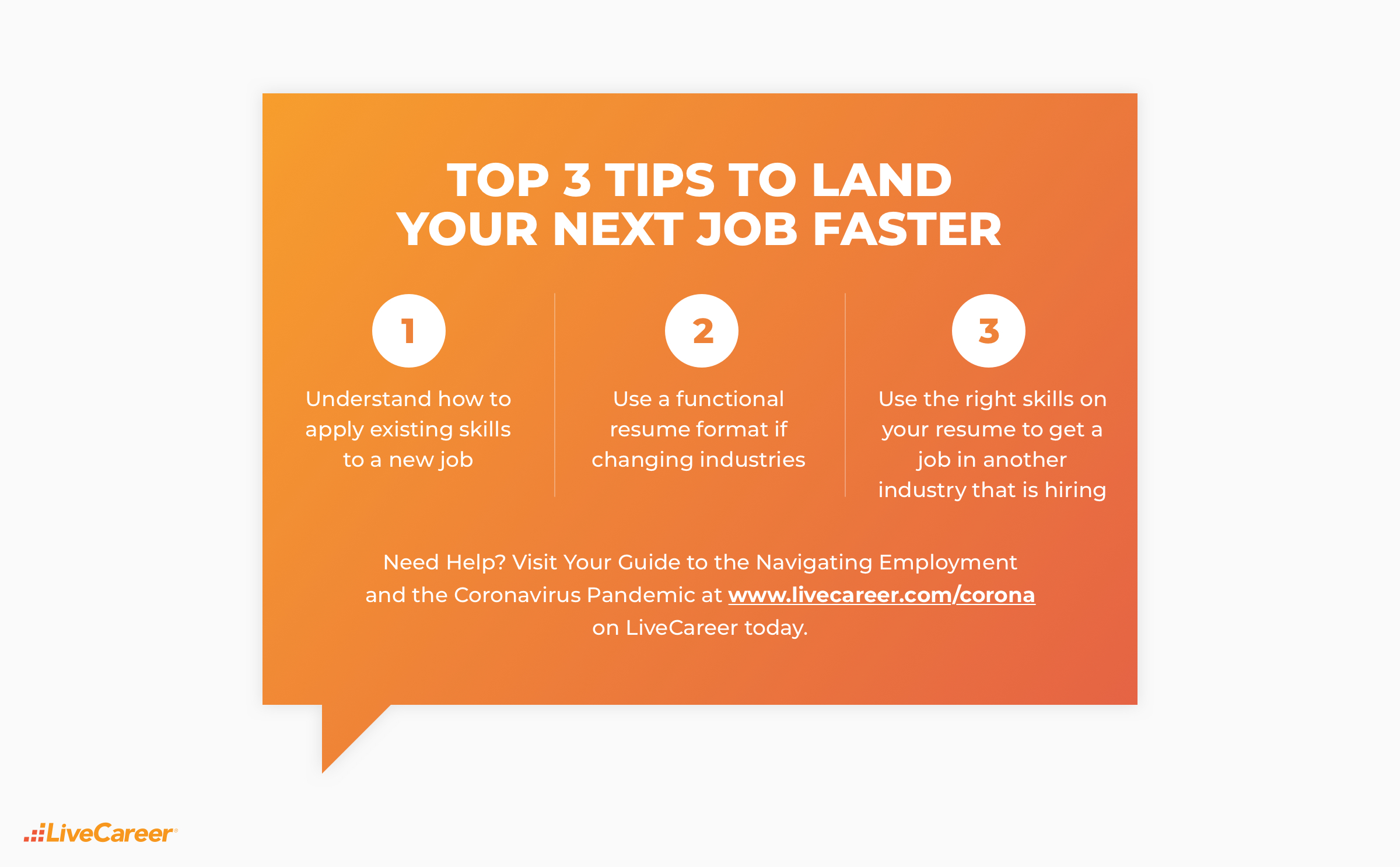A majority of job seekers can’t capture transferable skills on their resumes or identify how their skills apply to other industries, and they are not comfortable speaking with potential employers about those skill sets, a LiveCareer survey found.
This inability to understand and articulate their transferable skills threatens to make the stay on unemployment much longer for millions of job seekers who sorely need work.
The national survey of displaced workers found:
- 57% (20.8 million) can’t identify their transferable skills with a high degree of confidence.
- 58% (21.1 million) aren’t sure how to include transferable skills on their resume.
- 53% (19.3 million) can’t identify the best resume format to use to get their next job.
- 34% (12.4 million) can’t provide good examples of how their skills would apply to another job.
- 58% (21.1 million) aren’t confident they can find new jobs where their skills would apply.
- 56% (20.4 million) are looking for a job in a similar industry even though that industry may be significantly cutting back employment.
There is a transferable skills knowledge and confidence gap, a lethal combination for job seekers, according to findings of the survey of 1,519 job seekers unemployed because of COVID-19 conducted from May 6 – May 11, 2020 by which time more than 36.4 million workers had already filed for unemployment. When generalized to the population of COVID-displaced job seekers, the survey findings reveal the depth of the issues.
It is clear that knowledge of transferable skills has a positive waterfall effect. The survey results showed that among respondents who were “very familiar with transferable skills” there was a “high confidence” of how to apply them in all aspects of a job search — writing a resume, identifying jobs in other industries and speaking with potential employers about them. This group is equipped to find jobs quickly but they are in the minority.
“(The) advice I would give is to look at your skills broadly (even write them down), and think about how those skills could be applied to different work scenarios. Identifying transferable skills is key to tailoring your resume and marketing yourself in the job search,” said Kasey Kallevig, who lost her busser and hostess job in Arizona because of the pandemic. “I know I have many skills from past employment, school, internship and volunteering, so putting those skills together has helped me search for jobs more broadly.”
But job seekers are not doing this.
A majority, 56%, of job seekers say they are looking for work in the same industries from which they were laid off — that’s more than 20.4 million people casting a net in the very industries that were hardest hit when the economy went into a freefall, the survey found.
Karina Soto was an associate director of early learning programs at Florida Atlantic University before the pandemic. Now she’s looking for work in her old industry that “pays well and can be done remotely.” Looking in other industries is out of the question.
“I have invested a lot of time and money in becoming effective in my industry, and I feel that a change will set me back a few years and deplete my expert status,” she said. “I would not know how to redo my resume for jobs outside my industry.”
Millions unemployed do not have the potential opportunities and work situations afforded to Soto in her industry. With more than 36.4 million now filing jobless claims, this lack of knowledge and confidence foreshadows potential trouble for the tens of millions of unemployed workers seeking jobs if the economy doesn’t return to pre-pandemic employment levels.
Millions who worked in retail, restaurants, hospitality, travel and other major sectors face long-term disruptions to their careers. Job seekers who manage to capture transferable skills on their resumes or speak confidently about them in interviews can impress potential employers. Those who don’t will face a detrimental cascading effect in their careers.
Identifying transferable skills: The knowledge and confidence gap
Paul Segura stopped getting assignments in the convention industry eight weeks ago. Normally on staff at McCormick Place in Chicago, he believes it’s possible his line of work won’t be back in full force until mid- to late 2021. He’s switched careers before and while he remains confident in his abilities, he’s disheartened by having to do it again.
“I really fell in love with my current line of work, as it offered the flexibility that has been instrumental in maintaining my household,” Segura said. “I don’t know where else I’ll be able to strike that balance without having some college degree or certification.”
Millions of job seekers are just like Segura, frustrated by the prospect of finding employment in a new industry based on their existing skill set. In fact, according to the LiveCareer survey, only 43% of job seekers say they are at least very confident they can identify their transferable skills, but there are even more people — 20.8 million — who are not so sure of themselves.
Ashley Cross, a career counselor based in West Palm Beach, FL, says job seekers need the utmost confidence to make their transferable skills matter. “If the job search was bad before, you’re dealing with a lot more competition now,” she said. “What might have worked before (being ‘moderately confident’) won’t cut it now because employers need to know that you know how your skills from your previous job connect to this job.”
Otherwise, she adds, they just won’t make the investment. “Employers are not going to settle, especially if they’re in a place where they’ve needed to cut back and they need to be pickier about who they hire.”
Furthermore, the LiveCareer survey found, job seekers have a weaker grasp of soft skills than they do of hard skills. Only 40% believe they can capture soft skills on their resume (e.g., teamwork, communication, leadership), compared to 45% who say the same for hard skills (e.g., project management, software expertise, inventory management). Soft skills are typically the most transferable between jobs, and they will be massively important for workers in industries hit hardest by COVID.
For both hard and soft skills, the LiveCareer survey found a majority of job seekers lacking confidence in their ability to highlight those skills on their resume.
Many are also confused when it comes to resume formats. About one-third were not sure which resume format to use to highlight their specific skills, while 17% say they’d use a chronological resume, the less-than-ideal format for job seekers changing industries. That’s more than 19.3 million people not optimizing their resume for their job search.
Resumes are a passport to a job
Leah Cohen, an instructional assistant with a focus in special education, lost her job in California because of COVID-19, but she isn’t wasting any time looking for work.
“(I’m) doing a lot of online research about jobs or careers that utilize the skills I currently have,” Cohen said. “I am also open to further education or certification if I discover I either want to advance in my current career or want a complete shift.”
Workers like Cohen are well-positioned to find gainful employment. More than 100,000 small businesses have already permanently closed since the coronavirus pandemic hit the United States in March, according to a new study from researchers at the University of Illinois, Harvard Business School, Harvard University and the University of Chicago. That’s 2% of all small businesses simply evaporating despite Congress spending $700 billion to support them.
Big business isn’t immune. The nation’s largest health systems are laying off workers. Fed Chairman Jerome H. Powell told CBS News’s “60 Minutes” on May 17, that a full rebound from COVID-19 lockdowns may take until the end of 2021, because the United States suffered the “biggest shock that the economy’s had in living memory.” And workers are paying for it.
Most workers are not ready to make transitions, however. The survey found that 58% say they have at best a moderate level of confidence they can present important skills on their resume. Just 35% say they would have little or no trouble adapting their resume for a job in another industry.
Workers have to make the transition if they want to find employment quickly.
“There’s no way some industries are going to be able to pay their old wage bills,” Indiana University economist Joshua Bernstein said. “They will be laying off people, and those people won’t be able to find a job in the same industry — it’s impossible by construction. It’s an industry-level effect that’s taken hold.”
Donald Sjoerdsma is a freelance writer with more than five years’ experience in digital media. His work has appeared in a variety of publications, including Oprah.com, Yahoo! and HuffPost. While at OWN: Oprah Winfrey Network, his creative use of archival content was a driving force in the company’s success on YouTube. He received an M.S. in Journalism from Northwestern University, where he specialized in media innovation.
This article first appeared on LiveCareer.
































